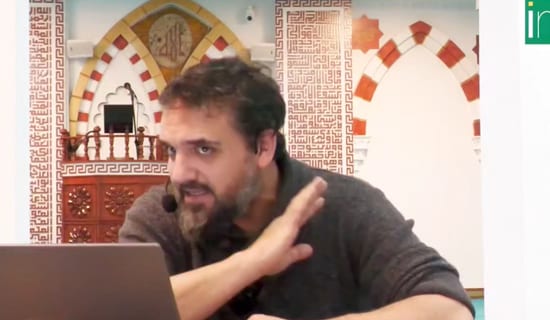The following report is now a complimentary offering from MEMRI's Jihad and Terrorism Threat Monitor (JTTM). For JTTM subscription information, click here.
On December 3, 2020, the London-based Qatari daily Al-Quds Al-Arabi, published an article which reports that in order to evade aerial attacks, Iran and its allied militias have developed the network of tunnels used by the Islamic State (ISIS) in the Al-Bukamal area on the Syria-Iraq border, and utilize them to transport people and weapons from Iraq to Syria and also as a place to store weapons.[1]
Reports have been published in the past in both Arab and Western media about Iran's use of tunnels in this area. For example, the Syrian opposition, Eye of the Euphrates Facebook page posted on July 17, 2020, that Iran and its allied militias were digging tunnels in the Deir Al-Zour Governorate.[2]

A map of the Deir Al-Zour area (alalamtv.net, 10.8.2017)
According to the Al-Quds Al-Arabi article, Iran began to use the tunnels to a limited extent in July 2020 and expanded the tunnel project following aerial attacks which paralyzed the movement of convoys from Iraq to Syria.
SUPPORT OUR WORK

Several workers from the city of Deir Al-Zour and the western rural area of the governorate who are digging the tunnels, told the paper that an extensive network of tunnels is being dug which includes enormous weapons storerooms and field hospitals, along the Iraqi-Syrian border and in the Al-Bukamal area, and especially close to the Al-Hamdan airport.
KH.M., a bulldozer driver who works with the militias in the Al-Bukamal area told the newspaper that due to the tough economic situation he is working at a digging site operated by the pro-Iranian militias. He says that the site is managed by Abu Muzahem, "a commander in the Iranian Revolutionary Guard Corps (IRGC) and resident of the 'Ayyash village which is located in the western rural area of Deir Al-Zour Governorate. The workers receive wages which are higher than average – about 50,000 Syrian pounds a week, which is the equivalent of about $100. He recounts that he and another 40 men, most of whom are truck or bulldozer drivers, were transported by bus to Al-Bukamal, where they were divided into several groups in four parts of the Al-Bukamal area. He added, "The work usually begins at 8 p.m. and continues until 3 a.m. The largest site is located next to Al-Hamdan airport. There they have finished expanding a tunnel and a huge storeroom which ISIS used in the past. Now the tunnel connects between Iraq and Syria. There are three big tunnels – two near the border crossing with Al-Qa'im and they are intended for transporting people and weapons. The third tunnel is 12 kilometers south of the crossing and is intended for the passage of senior officials who come from Iran and Iraq. The work is supervised by members of Iraqi and Iranian militias. All the workers are from the western rural area of Deir Al-Zour and each one underwent a security check in the past. During the week, the workers live in the city of Al-Bukamal. Every Friday the workers return to their homes. A drinking well is dug next to every site. All the bulldozers came from Iraq and have Iraqi license plates."
"A special Syrian source who is a member of the IRGC," told the newspaper that there are three main, large tunnels in Al-Bukamal. One connects between Iraq and Syria and is located about three kilometers north of the Al-Qa'im crossing. The work there is supervised by Mujtaba Al-J'afari, a senior Iraqi commander who works with armaments in the IRGC. The purpose of this tunnel is to transfer weapons. Fortified with concrete, it is six meters wide and five kilometers long. He said that the work there was conducted in a very professional manner and is almost complete, and that surveillance cameras and alarms have been installed in the tunnel.
According to the same source, the second tunnel is narrower but longer than the tunnel previously described. It is intended for the passage of people and is located five kilometers from the Al-Qa'im crossing. The work there was supervised by senior Lebanese and Iranian officials from Hizbullah, the most prominent among them the Iranian Hajji Mahadi, who speaks fluent Arabic and is responsible for food supply within Hizbullah. He is involved with all matters concerning the militias subordinate to Iran in Al-Bukamal and Deir Al-Zour. This tunnel is not reinforced with concrete, is six kilometers long, and every 500 meters there is a guard post with security cameras.
The third tunnel, which connects between Iraq and Syria, is 12 kilometers north of the Al-Qa'im crossing. It is six kilometers long and intended as a passage for very senior Iraqi officials and Iranians in the IRGC.
Syrian journalist Zain Al-'Akidi says that there are 14 storehouses in the Al-Bukamal area, the largest of which is located next to the Al-Hamdan airport. This storehouse was used by ISIS, and the IRGC expanded and fortified it. Today it also houses a training base and a Hizbullah communications unit. The complex is commanded by Hajj 'Othman, a Syrian from Talkalakh.
The second-largest storehouse is in the Al-Mayadin desert, and was also used in the past by ISIS. This storehouse contains a field hospital with advanced medical equipment.
The rest of the storehouses are located in the following areas: Al-Abbas, Al-Quriya, Sabikhan, Mahkan, Al-Taiba, Muhasan, Al-Jaffrah, Ayyash and Marrat.
According to media operative Khalaf Al-Khatar from Deir Al-Zour, the pro-Iranian militias utilize most of the tunnels which were used by ISIS in the past, and have even expanded them. In the city of Al-Mayadin there are three large tunnels and an underground field hospital. In Al-Mayadin there are tunnels underneath Al-Kurnish Street, next to the postal center and the cultural center. There are numerous tunnels and storehouses in the Al-Mayadin desert and also nearby the village of Mahkan.
[1] Al-Quds Al-Arabi (London), December 3, 2020.




